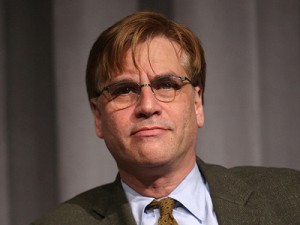 My bit of theater at the end of the contentious Aaron Sorkin “Newsroom” panel Wednesday was to echo a key scene in the show’s premiere.
My bit of theater at the end of the contentious Aaron Sorkin “Newsroom” panel Wednesday was to echo a key scene in the show’s premiere.
I scratched out a sign on a 8 1/2 by 11-inch card that said IT CAN BE and held it up from the seats of the Beverly Hilton ballroom so Sorkin, star Jeff Daniels and director Alan Poul could see.
The echo of Mackenzie MacHale’s gesture from the back of a Northwestern University lecture that goes off the rails for Daniels’ anchor character Will McAvoy, was meant as encouragement, a nod or at least an acknowledgement that the reaction they were facing at the HBO panel at the TV critics summer press tour wasn’t the monolith it was presented to be.
Some of my colleagues had been quite incensed at the show particularly how the women were supposedly drawn – they were supposed to be accomplished, but regularly said dumb things or didn’t know crucial facts.
Sorkin, the accomplished writer of things from “The West Wing” to “The Social Media,” disagreed, quoting individual scenes and reciting bits of dialogue as if he had committed them to memory when he put them to paper, or at least studied up like a lawyer facing his final argument.
“The female characters on the show are, first of all, every bit the equals of the men,” he said. “I think that they that they are not just talked about as being good at their job. We plainly see them being good at their job beginning with the first episode.”
Once the characters are defined as “being thoughtful, curious, plainly smart, of being great team players,” he says, then “you can have them slip on as many banana peels as you want. That’s just that’s just comedy.”
Daniels, sounding very much like his character McAvoy, with clipped, declarative sentences, piped up: “One of the things I like about Aaron’s writing — and then I’ll shut up — is that all of his characters, men and women, have flaws. They all have flaws.”
Sorkin bristled at reports that his writing staff was fired, or that one in the writers’ room was an ex-girlfriend. One thing he did say was he was augmenting the writers for season two with a phalanx of paid consultants “from television, print and online media representing every part of the ideological and political spectrum that you can imagine” to help bolster scripts. “I think it’s going to be a big bonus for the show.”
I asked whether the timeline of somewhat recent real news events covered on the show (Bin Laden is killed this Sunday), will ever catch up with the show and they’ll have to put in fictional news to cover.
“No,” he said. “We’ll never make up news. We’ll always be roughly the same distance behind. The show will be Season 2 will be back on the air again in June, and I’m just now beginning to map out in my head where we’re gonna be. We’ll always be anywhere between 9 and 18 months behind.”
And never is the pattern of doing relatively recent news meant as a running commentary about how news outlets should have covered the events, Sorkin says.
“I have exactly the same ability to comment on how the news should be covered as I have in how to create Facebook or how to run the Oakland A’s or how to get the communists out of Afghanistan after they invaded in 1979, which is to say none,” he says, referencing the basis of three of his screenplays, “The Social Network,” “Moneyball” and “Charlie Wilson’s War.”
“So it’s not a chance to do that. What it is is a chance to do what I love doing, which is creating a workplace environment that becomes a workplace family where everybody is a team and working towards a goal that, to me, feels noble,” he says.
“You know, the Don Quixote metaphor isn’t for nothing. We stick to it pretty closely. These are people reaching unrealistically high, and they’re going to fall down a lot. Those are the things that I love writing, writing romantically and idealistic, and it’s by no means a review of how the news was done.
“At the beginning of the third episode when Will does his on air apology and sort of announcement of this is what “News Night” is gonna be from now on, he makes it very clear that he does not apologize for all journalists nor do all journalists owe anyone an apology and that some of the greatest journalists who have ever worked are working right now, but he’s worried, Will is worried that their voices are being drowned out by people like him. And in terms of commenting on the news, that’s what we’ll do.”